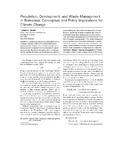| dc.contributor.author | Gwebu, T.D. | |
| dc.date.accessioned | 2010-03-22T09:22:03Z | |
| dc.date.available | 2010-03-22T09:22:03Z | |
| dc.date.issued | 2003 | |
| dc.identifier.citation | Gwebu, T.D. (2003) Population, development, and waste management in Botswana: Conceptual and policy implications for climate change, Environmental Management, Vol. 31, no. 3, pp.348-354 | en_US |
| dc.identifier.issn | 0364 152x | |
| dc.identifier.uri | http://hdl.handle.net/10311/478 | |
| dc.description.abstract | Based on government and other relevant documentation, this paper explores the conceptual linkage between population, development, and waste management in
Botswana and the implications of this relationship for global climate change. Population is increasing, albeit at a decreasing rate. Spatially, the population is becoming more and more concentrated as the rates and level of urbanization increase. Economic growth has remained consistently high. The combined effect of population dynamics and economic development
are having a noticeable imprint on the environment in the form of increased waste generation. Poor waste management
poses a real threat to environmental sustainability in general and climate change in particular because of inadequate technology,
weak institutional mechanisms to enforce regulations,
and low levels of sensitization among the public to deal with the problem. Mitigation measures are suggested to minimize the negative effects of waste management on climate change. | en_US |
| dc.language.iso | en | en_US |
| dc.publisher | Springer http://www.springerlink.com/index/3NU5AFH2F999FM9P.pdf - | en_US |
| dc.subject | Botswana | en_US |
| dc.subject | Waste management | en_US |
| dc.subject | Greenhouse gas emissions | en_US |
| dc.subject | Climate change | en_US |
| dc.title | Population, development, and waste management in Botswana: Conceptual and policy implications for climate change | en_US |
| dc.type | Published Article | en_US |

